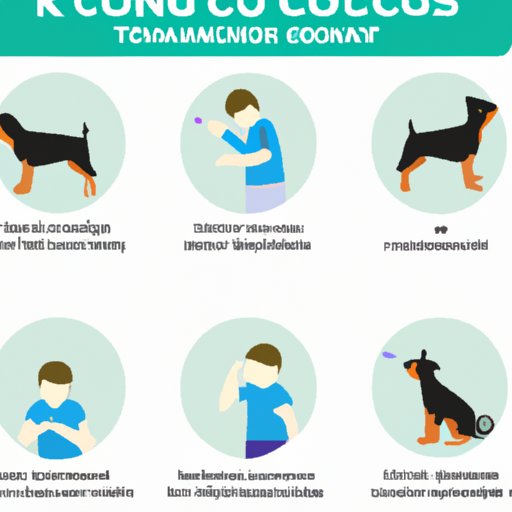Introduction
Kennel cough, also known as canine infectious tracheobronchitis, is a common respiratory infection in dogs. It is highly contagious and can spread quickly among dogs in close contact with each other, such as those in kennels, shelters, or doggy daycare facilities. While kennel cough is not typically life-threatening, it can be uncomfortable for your pup and lead to serious complications if left untreated.
Definition of Kennel Cough
Kennel cough is an upper respiratory infection caused by a combination of viral and bacterial agents. It is characterized by a dry, hacking cough that may be accompanied by sneezing, gagging, or reverse sneezing. Most cases of kennel cough are mild, however, some dogs may develop more severe symptoms such as fever, loss of appetite, lethargy, and difficulty breathing.
Overview of Symptoms
The most common symptom of kennel cough is a dry, hacking cough that may sound like your pup is trying to clear something from his throat. Other symptoms may include sneezing, gagging, reverse sneezing, fever, loss of appetite, lethargy, and difficulty breathing. If your pup is exhibiting any of these symptoms, it’s important to seek veterinary care right away.
Risk Factors
Dogs of any age, breed, or size can contract kennel cough, but puppies, older dogs, and those with weakened immune systems are at a higher risk. Dogs who come into contact with many other animals, such as those in kennels, shelters, boarding facilities, or doggy daycare centers, are also more likely to contract the infection.
Causes of Kennel Cough
Kennel cough is caused by a combination of viral and bacterial agents, including Bordetella bronchiseptica, parainfluenza virus, and canine adenovirus type 2. These agents are easily spread through direct contact with an infected dog, or through the air when an infected dog coughs or sneezes. Poor sanitation practices, such as inadequate cleaning and disinfection of surfaces or cages, can also contribute to the spread of the infection.

Treatment Options for Kennel Cough
Most cases of kennel cough are mild and can be treated at home with rest, fluids, and over-the-counter medications such as antihistamines or cough suppressants. However, if your pup is exhibiting more severe symptoms or does not seem to be improving after several days of home treatment, it’s important to seek veterinary care right away.
Your veterinarian may prescribe antibiotics to treat the underlying bacterial infection, as well as cough suppressants, anti-inflammatories, or steroids to help manage the coughing. In extreme cases, your vet may recommend hospitalization and oxygen therapy.
Prevention of Kennel Cough
The best way to prevent kennel cough is to keep your pup up-to-date on all recommended vaccinations. Vaccination is especially important if your pup will be coming into contact with many other animals, such as in a kennel, shelter, boarding facility, or doggy daycare center.
In addition to vaccination, good hygiene practices are also key to preventing the spread of kennel cough. This includes regularly cleaning and disinfecting surfaces and cages, and avoiding contact with sick dogs.
Types of Kennel Cough Vaccines
There are two types of kennel cough vaccines: core and non-core. Core vaccines are recommended for all dogs, regardless of their lifestyle or risk of exposure, while non-core vaccines should only be given to dogs at high risk of exposure (e.g., those living in kennels or shelters). Talk to your veterinarian to determine which type of vaccine is best for your pup.

Impact of Kennel Cough on Quality of Life
Kennel cough can have a significant impact on your pup’s quality of life. The persistent coughing can make it difficult for your pup to sleep or eat, and can lead to other complications such as dehydration or pneumonia. If your pup is exhibiting any of these symptoms, it’s important to seek veterinary care right away.

Cost of Treating Kennel Cough
The cost of treating kennel cough will vary depending on the severity of your pup’s condition and the type of treatment recommended. Veterinary care, medication, and vaccinations can all add up quickly, so it’s important to factor in the costs before making any decisions. Talk to your veterinarian to get an estimate of the costs involved.
Conclusion
Kennel cough is a common respiratory infection in dogs that can cause a variety of symptoms, from mild coughing to more serious complications such as fever and difficulty breathing. It is highly contagious and can spread quickly among dogs in close contact with each other. The best way to prevent kennel cough is to keep your pup up-to-date on all recommended vaccinations and practice good hygiene practices. Additionally, if your pup is exhibiting any symptoms of kennel cough, it’s important to seek veterinary care right away.
(Note: Is this article not meeting your expectations? Do you have knowledge or insights to share? Unlock new opportunities and expand your reach by joining our authors team. Click Registration to join us and share your expertise with our readers.)
